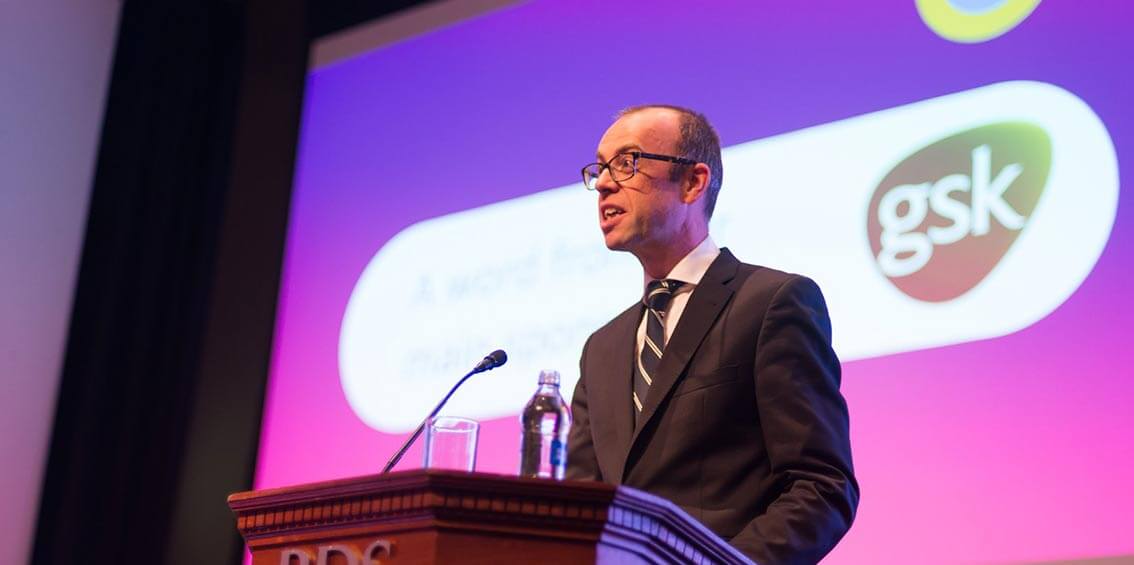As a company, GSK talked a lot about partnering with the health services and its relationship with the HMI was one partnership that they really valued, Mr. Liam Cullen, External Affairs Director, GSK, told the Conference. This was GSK’s 7th year as main sponsor of the HMI conference and regional events.

He said the previous speakers had clearly outlined the ambition for Sláintecare, which offered a roadmap for future healthcare provision in Ireland. Today was yet another forum where the detail could be discussed and debated. The commitment from the political system to a longer-term approach to development of a public health system was welcome but it would require focus and on-going commitment.
“Any new approach or strategy needs to be clear and it must resonate. Whether you work for the HSE or a large pharmaceutical multinational, there must be a common cause that people can rally behind.”
Our long-standing values of Trust, Respect, Integrity and Patient Focus stand, but we have introduced a new set of expectations to shape behaviour. Those are Courage, Accountability, Development and Teamwork.
Mr. Cullen said that as awareness of corporate governance rose, particularly in the wake of the financial crisis, organisations began to place much more emphasis on words like vision, mission and values. Too often these were just words that appeared in Board Rooms and Annual Reports but meant little to employees or the public.
“As a company, we, in GSK, put real emphasis behind concepts like values and culture. However, when it came to our commercial strategy, our shared understanding was less defined and was more ephemeral.
“When our new CEO, Emma Walmsley, took the helm 18 months ago she very quickly introduced a new simplified strategy for the company. Consequently, we embarked on a new journey of change in the organisation. Even though there are three distinct business units in the company, pharma, consumer healthcare and vaccines, every one of the 110,000 employees, was asked to align behind three pillars: Innovation, Performance and Trust. Each person’s annual performance plan must demonstrate delivery across those three pillars.
“For us, Innovation means: delivering on our pipeline/ R&D model and access to our innovative medicines for patients.
“Performance – as a commercial organisation we need to have clear performance metrics and deliver against targets set (KPIs).
“Finally, Trust – this focuses on our corporate reputation, the development of our people. For the public health system, trust revolves around our commitment to supply and our approach to pricing of our medicines and vaccines. I would like to think we deliver on both fronts for the HSE.
To deliver on strategy we believe you need a few key things:
- The very best people to support the adoption of the strategy set.
- To model and define the culture of the organisation, either through the actions you take as a leader or in the people you appoint
- And finally manage risk, whether that be in terms of Reputation. Operational or strategic risk.”
“We are also on a journey of cultural change. Our long-standing values of Trust, Respect, Integrity and Patient Focus stand, but we have introduced a new set of expectations to shape behaviour. Those are Courage, Accountability, Development and Teamwork.”
“For us to execute delivery, we needed to increase our PACE, (evaluate and calculate risk, fail better) FOCUS only what matters, aligned to IPT and finally ACCOUNTABILITY is critical and expected at an individual level. It has only been 18 months, but it does feel different at GSK. Will we get everything right? That’s highly unlikely but as long as we create room and willingness to make mistakes and correct as we go, hopefully we will make progress. “
Mr. Cullen said this journey to realise GSK’s new vision had not come about from extra funding or resourcing or indeed any new performance schemes, it was essentially about changing the way in which they worked collectively and as individuals.
“There has been tremendous value in distilling down in very clear terms, our organisation’s ambition and indeed challenge. As you begin the process of developing plans to support change in your own organisations, there may be something in our story that resonates. “

